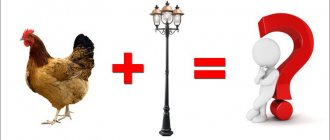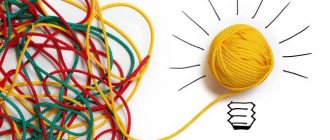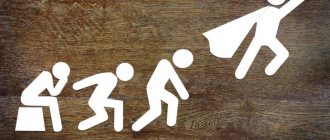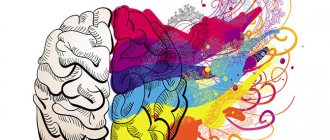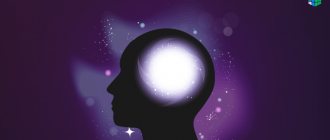Every day we are faced with many tasks, the solution of which requires our ability to think logically. Logic as the ability to think and reason consistently and consistently is required in many life situations, from solving complex technical and business problems to persuading interlocutors and making purchases in a store.
But despite the high need for this skill, we often make logical mistakes without knowing it. Indeed, among many people there is an opinion that it is possible to think correctly on the basis of life experience and so-called common sense, without using the laws and special techniques of “formal logic”. To perform simple logical operations, express elementary judgments and simple conclusions, common sense can also be suitable, but if we need to understand or explain something more complex, then common sense often leads us to errors.
The reasons for these misconceptions lie in the principles of development and formation of the foundations of logical thinking in people, which are laid in childhood. Teaching logical thinking is not carried out purposefully, but is identified with mathematics lessons (for children at school or for students at the university), as well as with solving and passing a variety of games, tests, tasks and puzzles. But such actions contribute to the development of only a small proportion of logical thinking processes. In addition, they explain to us the principles of finding solutions to tasks in a rather primitive manner. As for the development of verbal-logical thinking (or verbal-logical), the ability to correctly perform mental operations, consistently come to conclusions, for some reason we are not taught this. That is why the level of development of people's logical thinking is not high enough.
We believe that a person’s logical thinking and his ability to cognition should develop systematically and on the basis of a special terminological apparatus and logical tools. During the classes of this online training, you will learn about self-education methods for the development of logical thinking, get acquainted with the main categories, principles, features and laws of logic, and also find examples and exercises for applying the acquired knowledge and skills.
What is logical thinking?
To explain what “logical thinking” is, let’s divide this concept into two parts: thinking and logic. Now let's define each of these components.
Human thinking is a mental process of processing information and establishing connections between objects, their properties or phenomena of the surrounding world. Thinking allows a person to find connections between the phenomena of reality, but in order for the connections found to truly reflect the true state of affairs, thinking must be objective, correct or, in other words, logical, that is, subject to the laws of logic.
Logic translated from Greek has several meanings: “the science of correct thinking”, “the art of reasoning”, “speech”, “reasoning” and even “thought”. In our case, we will proceed from the most popular definition of logic as a normative science about the forms, methods and laws of human intellectual mental activity. Logic studies ways to achieve truth in the process of cognition in an indirect way, not from sensory experience, but from knowledge acquired earlier, therefore it can also be defined as the science of ways to obtain inferential knowledge. One of the main tasks of logic is to determine how to come to a conclusion from existing premises and gain true knowledge about the subject of thought in order to gain a deeper understanding of the nuances of the subject of thought being studied and its relationships with other aspects of the phenomenon under consideration.
Now we can define logical thinking itself.
Logical thinking is a thought process in which a person uses logical concepts and constructions, which is characterized by evidence, prudence, and the goal of which is to obtain a reasonable conclusion from existing premises.
There are also several types of logical thinking; we list them, starting with the simplest:
1
Figurative-logical thinking
Figurative-logical thinking (visual-figurative thinking) - various thought processes of the so-called “figurative” problem solving, which involves a visual representation of the situation and operating with images of its constituent objects. Visual-figurative thinking, in fact, is synonymous with the word “imagination”, which allows us to most vividly and clearly recreate the whole variety of different actual characteristics of an object or phenomenon. This type of human mental activity is formed in childhood, starting from approximately 1.5 years.
To understand how developed this type of thinking is in you, we suggest you take the IQ Test “Raven’s Progressive Matrices”
The Raven's Test is a progressive matrix scale for assessing IQ, mental ability, and logical thinking, developed in 1936 by John Raven and Roger Penrose. This test can give the most objective assessment of the IQ of the people being tested, regardless of their level of education, social class, type of activity, linguistic and cultural characteristics. That is, it can be said with a high probability that the data obtained as a result of this test from two people from different parts of the world will evaluate their IQ equally. The objectivity of the assessment is ensured by the fact that this test is based solely on images of figures, and since Raven's matrices are among non-verbal intelligence tests, its tasks do not contain text.
The test consists of 60 tables. You will be offered drawings with figures connected to each other by a certain relationship. One figure is missing; it is given at the bottom of the picture among 6-8 other figures. Your task is to establish a pattern that connects the figures in the picture and indicate the number of the correct figure by choosing from the proposed options. Each series of tables contains tasks of increasing difficulty, at the same time, the complication of the type of tasks is observed from series to series.
Statistics Full screen
2
Abstract logical thinking
Abstract-logical thinking is the performance of a thought process using categories that do not exist in nature (abstractions). Abstract thinking helps a person model relationships not only between real objects, but also between abstract and figurative ideas that thinking itself has created. Abstract logical thinking has several forms: concept, judgment and inference, which you can learn more about in the lessons of our training.
3
Verbal and logical thinking
Verbal-logical thinking (verbal-logical thinking) is one of the types of logical thinking, characterized by the use of linguistic means and speech structures.
This type of thinking requires not only the skillful use of thought processes, but also competent command of one’s speech. We need verbal-logical thinking for public speaking, writing texts, arguing, and in other situations where we have to express our thoughts using language.
Ways to develop logical thinking
If you are determined to take up pumping your brain, then the first thing you need to do is eradicate your laziness and start looking for suitable methods and tasks. There are a huge number of ways to train your thinking. Let's look at some of them in more detail:
Board games. Couples and for a large group of friends, serious and humorous - the choice is huge, you just need to determine which type is more interesting to you. The most popular board games for developing human logical thinking include:
- Chess;
- Checkers;
- Backgammon;
- "Monopoly" ("Big Business");
- “Scrabble” (“Scrabble”, “Bulda”);
- Card games (“Munchkin”, “Uno”).
Logic problems. When searching for and selecting logical problems, use books or the Internet, which is full of various examples and thematic collections. Start with the easiest level, gradually increasing the load, moving towards the highest level of difficulty. If you don’t know the answer, don’t hesitate to peek, because knowing the source data will help you understand the solution and the construction of a logical chain. This type of task includes:
- Puzzles;
- Graphic puzzles;
- Word problems;
- Puzzles;
- Anagrams;
- Puzzles;
- Rubik's Cube;
- Solitaire games (“Mahjong”, types of card layouts).
Example of a logical problem: Seven sisters spend their leisure time together. The first one plays chess. The second one is reading. The third one is cleaning. The fourth one is watering the flowers. The fifth one is playing with the cat. The sixth one is embroidering. What does the seventh sister do? Correct answer: The seventh sister plays chess with the first.
- Test tasks for intelligence. There are many online tests based on the principle of cause and effect. Most often these are games of the “Find the odd one out” type.
- Puzzles, crosswords, scanwords, teawords and more. Particularly difficult are the digital types - Japanese crosswords and Sudoku. Also, an excellent task for developing the ability to think logically would be to independently compose a crossword puzzle.
- Mastering deductive and inductive methods. Deduction is logic in its purest form. In 99.99% of cases, the deductive method gives the correct answer to the problem. In everyday life, induction is more often used - reasoning based on facts that have a certain percentage of falsity. In simpler terms, inductive reasoning begins with particular conclusions and seeks confirmation in general concepts. The deductive method, on the contrary, originates from the external world, and the conclusion is already presented in the form of individual conclusions.
Example of a deductive method: Winter has come and that’s why it’s snowing outside.
An example of the inductive method: It snowed outside, therefore winter has come.
Applying logic
Thinking using the tools of logic is necessary in almost any area of human activity, including the exact sciences and humanities, economics and business, rhetoric and public speaking, the creative process and invention. In some cases, strict and formalized logic is used, for example, in mathematics, philosophy, and technology. In other cases, logic only provides a person with useful techniques for obtaining a reasonable conclusion, for example, in economics, history, or simply in ordinary “life” situations.
As already mentioned, we often try to think logically on an intuitive level. Some people do it well, some do it worse. But when connecting the logical apparatus, it is better to know exactly what mental techniques we use, since in this case we can:
- It’s more precise to choose the right method that will allow you to come to the right conclusion.
- Think faster and better - as a consequence of the previous point.
- It's better to express your thoughts.
- Avoid self-deception and logical fallacies.
- Identify and eliminate errors in other people’s conclusions, cope with sophistry and demagoguery.
- Use the necessary argumentation to convince your interlocutors.
Thinking, speech and logic
Human thinking is verbal, it is formed in the process of communication and its formation is possible only through the joint activity of people. All people are different, some people find it easier to think if they see or imagine objects - this is visual thinking. Others operate with abstract structures (words) - this is what distinguishes verbal logical thinking.
Speech is a form of communication between people using language constructs created according to historically established rules, the highest mental function of a person. Speech formulates thoughts using words and presupposes their understanding and perception by another person.
Logic literally means reasoning, speech, thought. Logic is a science that teaches us to draw conclusions indirectly, that is, not from sensory experience, but from previously acquired knowledge.
Components of logical thinking
The use of logical thinking is often associated with quickly solving logic tasks and passing tests to determine the level of intellectual development (IQ). But this direction is associated to a greater extent with bringing mental operations to automatism, which is a very insignificant part of how logic can be useful to a person.
The ability to think logically combines many skills in the use of various mental actions and includes:
- Knowledge of the theoretical foundations of logic.
- The ability to correctly perform such mental operations as: classification, specification, generalization, comparison, analogy and others.
- Confident use of key forms of thinking: concept, judgment, inference.
- The ability to argue your thoughts in accordance with the laws of logic.
- The ability to quickly and effectively solve complex logical problems (both educational and applied).
Of course, such operations of thinking using logic as definition, classification and categorization, proof, refutation, inference, conclusion and many others are used by every person in his mental activity. But we use them unconsciously and often with errors, without a clear idea of the depth and complexity of those mental actions that make up even the most elementary act of thinking. And if you want your logical thinking to be truly correct and rigorous, you need to learn this specifically and purposefully.
Exercises to develop logical thinking
There are many ways to develop logical thinking in activities. For example, psychologists advise reading more
And it doesn’t matter whether it’s fiction or scientific literature, the main thing is to comprehend what you read, write down your thoughts and conclusions, argue with the author, catch him in contradictions. Board and computer games based on logic, for example, chess, checkers, sea battle and others, help well in the development of logic.
You can also use specially designed exercises for this purpose.
Exercise "Logical chains"
This is one of the most common training tasks for the development of logic. It has many forms, types, modifications for different ages. His goal is to learn to establish logical connections between things, phenomena, and concepts.
Option 1
Example: two objects are given - a fish and a bottle. Find what can connect them. Possible answers include the following:
- both objects have a similar streamlined shape;
- both the fish and the bottle are associated with water;
- if the bottle is plastic, then it, like a fish, can swim;
- the fish and the bottle may have the same color;
- both objects contain substances useful to humans, etc.
You can continue the list further or choose new objects, making sure that at first glance they are completely different and have nothing in common (a cat and a chair, ice cream and a car, etc.).
Option 2
Two events occur, separated by a relatively short period of time:
- A pencil falls from the desk of the head of the company to the floor.
- A fire breaks out in a room at one of the southern resorts.
Establish a logical connection between the first and second events. See how many intermediate events are in your logical chain. Try to build another one, where there are more or less events.
If the exercise is carried out in a group, then it will be interesting to compare and analyze the logical chains of all participants and choose the most interesting one. You can continue the exercise by coming up with the next event and establishing a connection between the fire and it.
Exercise “Making sentences”
Logical thinking is closely related to speech activity; it generally occurs primarily in conceptual and symbolic form. Therefore, to develop logical thinking, it is useful to write short (and long) stories, essays, notes, and keep a diary.
And for those who are not very good at this or are sorry for the time, you can start with individual proposals. But not simple ones, but ones that unite unrelated concepts and objects. Your task is not just to write a sentence, but so that it looks completely logical.
Let's select three objects that are as unrelated to each other as possible. For example: “squirrel”, “helicopter” and “cup of cappuccino”. Now make up a phrase that logically combines these objects. For example, a sentence like this could be written: “I was relaxing on the veranda when a squirrel fell out of a helicopter flying above me and plopped right into my cup of cappuccino.”
Try to come up with your own sentence or choose the other three objects. For example: scissors, shark, kebab; book, lemon, circus, etc.
Exercise “I’ll say it differently”
This exercise is also for the development of verbal thinking, which is the basis of logical thinking. Come up with some simple, even banal phrase regarding an everyday event. For example: “We love Friday because it is the last day of the work week.”
Now express the same idea, but in different words. The main condition: not a single word from the original phrase should be repeated. How many new sentences with the same meaning can you create?
Logical thinking is undoubtedly important, and it is impossible to do without it in any area of life. But imaginative thinking is no less important.
How to learn this?
Logical thinking is not given to us from birth, it can only be learned. There are two main aspects of teaching logic: theoretical and practical.
Theoretical logic
, which is taught at universities, introduces students to the basic categories, laws and rules of logic.
Practical training
aimed at applying the acquired knowledge in life. However, in reality, modern teaching of practical logic is usually associated with passing various tests and solving problems to test the level of intelligence development (IQ) and for some reason does not address the application of logic in real life situations.
To truly master logic, you need to combine theoretical and applied aspects. Lessons and exercises should be aimed at developing intuitive, automated logical tools and consolidating the acquired knowledge in order to apply it in real situations.
Based on this principle, the online training that you are reading now was compiled. The purpose of this course is to teach you to think logically and apply logical thinking techniques. Classes are aimed at introducing the basics of logical thinking (thesaurus, theories, methods, models), mental operations and forms of thinking, rules of argumentation and laws of logic. In addition, each lesson contains tasks and exercises to train you to use the acquired knowledge in practice.
Verbal logical thinking
Thanks to verbal thinking, we operate with such concepts as honor, conscience, love, value. After all, we cannot visualize them - these are verbal constructions , perhaps everyone puts their own meaning into them.
As a result of verbal logical thinking, a person can operate with the most abstract concepts without completely breaking away from sensory experience. With its help, we look for and find patterns, generalize previously gained experience - both sensory and visual.
Verbal logical thinking does not descend upon us overnight; it is gradually formed throughout life, in the process of learning and gaining personal experience. Some people master it to a greater extent than others; we call them talents or geniuses, while others master it less.
Logic lessons
Having collected a wide range of theoretical materials, as well as having studied and adapted the experience of teaching applied forms of logical thinking, we have prepared a series of lessons for the full mastery of this skill.
Lesson 1. Logical analysis of language
We will devote the first lesson of our course to a complex but very important topic - the logical analysis of language. It’s worth mentioning right away that this topic may seem abstract to many, loaded with terminology, and inapplicable in practice. Don't be scared! Logical analysis of language is the basis of any logical system and correct reasoning. The terms that we learn here will become our logical alphabet, without knowledge of which we simply cannot go further, but gradually we will learn to use it with ease.
Lesson 2. Concept in logic
A logical concept is a form of thinking that reflects objects and phenomena in their essential features. Concepts come in different types: concrete and abstract, individual and general, collective and non-collective, irrespective and correlative, positive and negative, and others. Within the framework of logical thinking, it is important to be able to distinguish these types of concepts, as well as produce new concepts and definitions, find relationships between concepts and perform special actions on them: generalization, limitation and division. You will learn all this in this lesson.
Lesson 3. Definition in logic
In the first two lessons, we talked about how the task of logic is to help us move from an intuitive use of language, accompanied by errors and disagreements, to a more orderly use of it, devoid of ambiguity. The ability to handle concepts correctly is one of the skills required for this. Another equally important skill is the ability to correctly define. In this lesson we will tell you how to learn this and how to avoid the most common mistakes.
Lesson 4. Logical reasoning
Logical judgment is a form of thinking in which something is affirmed or denied about the surrounding world, objects, phenomena, as well as relationships and connections between them. Judgments in logic consist of a subject (what the judgment is about), a predicate (what is said about the subject), a copula (what connects the subject and the predicate) and a quantifier (the scope of the subject). Judgments can be of various types: simple and complex, categorical, general, particular, individual. The forms of connectives between the subject and the predicate also differ: equivalence, intersection, subordination and compatibility. In addition, within the framework of composite (complex) judgments there can be their own connectives, which define six more types of complex judgments. The ability to think logically presupposes the ability to correctly construct various types of judgments, understand their structural elements, features, relationships between judgments, and also check whether a judgment is true or false.
Lesson 5. Laws of logic
Before moving on to the last third form of thinking (inference), it is important to understand what logical laws exist, or, in other words, objectively existing rules for constructing logical thinking. Their purpose, on the one hand, is to help build inferences and argumentation, and on the other hand, to prevent errors and violations of logic associated with reasoning. This lesson will examine the following laws of formal logic: the law of identity, the law of excluded middle, the law of contradiction, the law of sufficient reason, as well as De Morgan's laws, the laws of deductive inference, Clavius' law and the laws of division. By studying examples and completing special exercises, you will learn how to purposefully use each of these laws.
Lesson 6. Inference
Inference is the third form of thinking in which from one, two or more propositions, called premises, a new proposition, called a conclusion or conclusion, follows. Inferences are divided into three types: deductive, inductive and analogical inferences. In deductive inference (deduction), a conclusion is drawn from a general rule for a particular case. Induction is inference in which a general rule is derived from several particular cases. In inferences by analogy, based on the similarity of objects in some characteristics, a conclusion is drawn about their similarity in other characteristics. In this lesson you will become familiar with all types and subtypes of inferences and learn how to build various cause-and-effect relationships.
Lesson 7. Syllogisms
This lesson will focus on multi-premise inferences. Just as in the case of single-premise conclusions, all the necessary information in a hidden form will already be present in the premises. However, since there will now be many premises, the methods for extracting them become more complex, and therefore the information obtained in conclusion will not seem trivial. In addition, it should be noted that there are many different types of multi-premise inferences. We will focus only on syllogisms. They differ in that both in the premises and in the conclusion they have categorical attributive statements and, based on the presence or absence of some properties in objects, they allow one to draw a conclusion about the presence or absence of other properties in them.
Lesson 8. Types of reasoning
In previous lessons we talked about various logical operations that form an important part of any reasoning. Among them were operations on concepts, definitions, judgments and inferences. This means that at this point it should be clear what components the reasoning consists of. However, we have not yet touched upon the questions of how reasoning as a whole can be organized and what types of reasoning there are in principle. This will be the topic of the last lesson. Let's start with the fact that reasoning is divided into deductive and plausible. All types of inferences discussed in previous lessons: inferences using a logical square, appeals, syllogisms, enthymemes, sorites, are precisely deductive reasoning. Their distinctive feature is that the premises and conclusions in them are connected by a relation of strict logical consequence, while in the case of plausible reasoning there is no such connection. First, let's talk more about deductive reasoning.
How to take classes?
The lessons themselves with all the exercises can be completed in 1-3 weeks, having mastered the theoretical material and practiced a little. But to develop logical thinking, it is important to study systematically, read a lot and constantly train.
For maximum effect, we recommend that you first simply read all the material, spending 1-2 evenings on it. Then take 1 lesson daily, doing the necessary exercises and following the suggested recommendations. After you have mastered all the lessons, engage in effective repetition using this technique to remember the material for a long time. Next, try to apply logical thinking techniques more often in life, when writing articles, letters, when communicating, in disputes, in business, and even in your leisure time. Reinforce your knowledge by reading books and textbooks, as well as using additional material, which will be discussed below.
Why does a person need to develop logic and memory?
Developed memory and logical thinking are simply necessary in everyday life - when performing professional tasks, as well as in everyday affairs.
By developing memory and logic, you will learn to concentrate your attention and control your thoughts. As a result, it will be easier for you to focus on current tasks and organize your own life.
By performing exercises to develop memory, after a certain period of time you will begin to notice that when solving problems, you use very non-standard and effective methods that would not have occurred to you before.
Books and textbooks on logic
On this page we have selected useful books and textbooks that will help you deepen your knowledge of logic and logical thinking:
- "Applied Logic".
Nikolai Nikolaevich Nepeyvoda; - "Textbook of Logic".
Georgy Ivanovich Chelpanov; - "Logic: lecture notes."
Dmitry Shadrin; - "Logics.
Training course" (educational and methodological complex). Dmitry Alekseevich Gusev; - “Logic for Lawyers” (collection of problems).
HELL. Getmanova; - "Logics.
Textbook for law schools." IN AND. Kirillov, A.A.Starchenko - "Logics.
Textbook for high school." Vinogradov S.N., Kuzmin A.F. - "Logics.
Textbook for humanities faculties." A.A.Ivin - "Logics".
Ivanov E.A. - And others.
Trainings
Training and development of logical thinking can be supplemented by the following trainings, which you can take for free on our website:
1. Memory and attention are important abilities for logical thinking, which will allow you to concentrate on a large number of mental objects on which logical operations are carried out.
2. Creative thinking together with logic will give you the opportunity not only to draw correct conclusions, but to look for non-standard solutions where logic has reached a dead end.
3. Oratory and writing skills form verbal and logical thinking, and also allow you to apply the acquired knowledge in practice in this course.
4. Mental arithmetic and speed reading are suitable for developing and training intellectual abilities.
5. Human psychology is useful in understanding logical thinking, because it is psychology as a science that studies mental operations, motives, and incentives of a person.



